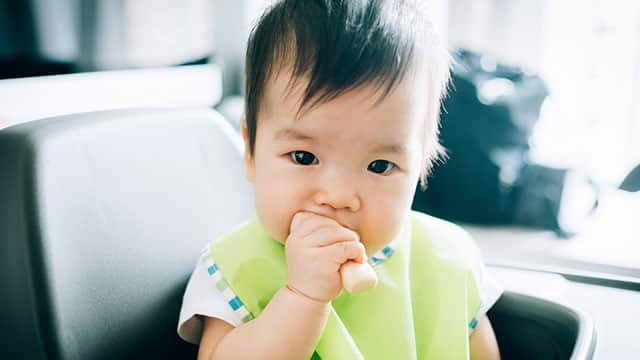Why Teething Causes A Cough
Your baby's first teeth will start popping out between 4 and 8 months. And it can last until their nearly 3 years old. With the teething can come the following symptoms:
- Irritability
- Rashes
- Increased biting
- Low-grade fevers
- Cheek rubbing
- Ear pulling
- Diarrhea
- Excessive saliva
That extra saliva can lead to drooling and sore skin near the mouth. However, when the saliva goes down the baby's throat instead — it can result in a teething cough.
Differences Between A Teething Cough And A Cold
During teething, babies are more susceptible to illness as their natural immunity from their mother fades away. And because of this, it's difficult for parents to know if their cough is from a cold or teething. Symptoms can include:
- Runny nose
- Sneezing
- Loss of appetite
- Swollen glands
- Fever
A runny nose, sneezing, and swollen glands can cause a cough. But if they have clear sinuses and you have a laundry basket full of extra burp cloths from their excess drooling and chewing — it probably means your baby is teething.
When To Take Your Baby To A Pediatrician
In 7-10 days, most colds will cease within babies, says the Cleveland Clinic. But if other significant symptoms arise, see your pediatrician immediately. Those symptoms include:
- Fever in a baby less than 2 months old
- Blue lips
- Wheezing
- Fast breathing or other breathing problems
- Excessive sleeplessness and irritability
- Ear pain
- Cough lasting longer than 3 weeks
How To Ease Your Baby's Cough
There are a few remedies to help your baby's cough, according to the Cleveland Clinic. They include:
- Using a humidifier in the baby's room to create moist air for soothing their irritated throat
- Running hot water in your bathroom, turning it into a sauna, and sitting in there holding your baby.
- Giving your baby a warm bath, but never leaving them alone
- Applying pediatrician-approved chest rub with natural ingredients
Is it a teething cough? Or is it a cold cough? Hopefully, now you can make that call. If you're still unsure or worried about their cough or health, you should call your pediatrician to schedule an appointment. During this stage in your infant's short little life, it's always better to be safe than sorry. Just remember to wash those burp cloths — you'll never be sorry you did.
Oral Care Center articles are reviewed by an oral health medical professional. This information is for educational purposes only. This content is not intended to be a substitute for professional medical advice, diagnosis or treatment. Always seek the advice of your dentist, physician or other qualified healthcare provider.
ORAL HEALTH QUIZ
What's behind your smile?
Take our Oral Health assessment to get the most from your oral care routine
ORAL HEALTH QUIZ
What's behind your smile?
Take our Oral Health assessment to get the most from your oral care routine















